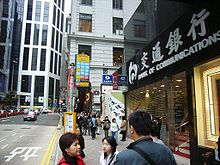Bank of Communications: Difference between revisions
Instantnood is banned from adding or removing any category related to China from any article related to China. He may be blocked without further warning for up to a week for each violation. |
m robot Adding: ru:Bank of Communications |
||
| Line 40: | Line 40: | ||
[[Category:Banks of the People's Republic of China]] |
[[Category:Banks of the People's Republic of China]] |
||
[[ru:Bank of Communications]] |
|||
[[zh:交通銀行]] |
[[zh:交通銀行]] |
||
Revision as of 20:10, 17 May 2007
| File:Bank of Communications logo.GIF | |
| Company type | Public |
|---|---|
| Industry | Finance and Insurance |
| Founded | 1908 |
| Headquarters | Shanghai, China |
Key people | Chaoliang Jiang, Chairman Jianguo Zhang, President |
| Products | Financial Services |
| Revenue | 434,046,000,000 renminbi (2018) |
Number of employees | 50,000 |
| Website | www.bankcomm.com |
Bank of Communications Limited (BoCom or BoComm) SEHK: 3328 (simplified Chinese: 交通银行; traditional Chinese: 交通銀行; pinyin: Jiāotōng Yínháng) Founded in 1908 (the 34th year of the Guangxu reign period, Qing Dynasty), the Bank of Communications emerged as one of the first few major national and note-issuing banks in China in the early days, and was chartered as "the Bank for developing the country's industries". In order to expand business to the overseas arena, the Bank opened its first Hong Kong Branch on 27 November 1934.
After the Chinese civil war ended in 1949, the Bank of Communications was effectively split into two operations, just like Bank of China, and just like Bank of China, part of the Bank of Communications relocated to Taiwan with the Kuomintang government. The bank is also known as Bank of Transportation (交通銀行, Chiao Tung Bank) in Taiwan. It has eventually merged with the International Commercial Bank of China (中國國際商業銀行), the renamed Bank of China in Taiwan after its 1971 privatization to become the Mega International Commercial Bank (兆豐國際商業銀行).The Mainland operation is the current entity known as the Bank of Communications.
Following the State Council's decision to restructure the Bank in 1986, the Bank was then restructured and re-commenced operations on 1 April 1987. Since then, its Head Office has been relocated from Beijing to Shanghai.
Today, the Bank of Communications is amongst the top 5 leading commercial banks in China and has an extensive network of over 2,800 branches covering over 80 major cities. Apart from Hong Kong, the Bank has also established overseas branches in New York, Tokyo, Singapore and representative offices in London and Frankfurt. As of end-2002, the Bank had over 45,000 employees and a total asset reaching RMB 766.874 billion. The Bank was awarded "The Best Bank in China" by international acclaimed magazines Euromoney and Global Finance in 1998 and 1999 respectively. According to the latest ranking of 1000 banks worldwide conducted by the authoritative magazine The Banker, Bank of Communications was ranked 94th, its first time to join the Top-100 list. In addition, the Feb 2003 edition of The Banker also ranked Bank of Communications 92nd amongst the 100 most efficient lending banks of the world.

Events in 2005
As of January 2005, 19.9% of the bank is owned by HSBC. An HSBC spokeswoman said HSBC Holdings Plc and its 19.9 pct-held Bank of Communications (BoComms) affiliate, would seek to acquire a brokerage in order to expand their operations in China. The plan was part of HSBC's broader China expansion strategy, but "there is nothing further to disclose at the present." HSBC's operations in China include its own banking operations, its stake in BoCom and an eight-pct stake in Bank of Shanghai. HSBC also holds a 19.9% stake in Ping An Insurance (Group) Co of China through its wholly owned subsidiary HSBC Insurance Holdings. The South China Morning Post today cited Peter Wong Tung-shun, executive director at The Hongkong and Shanghai Banking Corporation, as saying that the acquisition is being considered in the light of the Chinese government's reforms of the country's securities brokerages. This includes a provision allowing foreign companies to get management control of brokerage firms. Wong did not provide a timetable for any acquisition or identify any acquisition target. The Hongkong and Shanghai Banking Corp is a wholly owned HSBC subsidiary.
